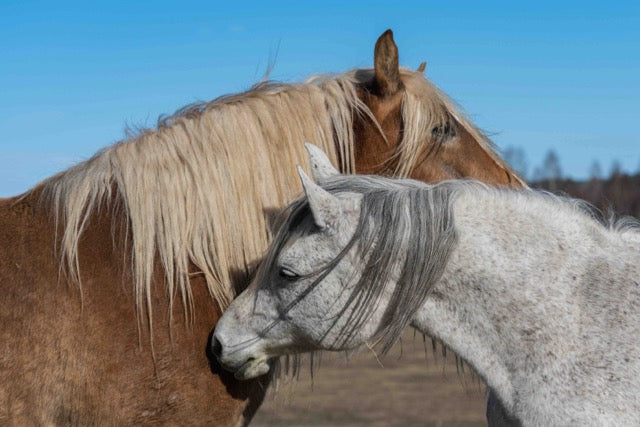
Tips for managing Allergy Season Symptoms- Q & A with Dr. Wellspring
Why Do We Use Antihistamines for Allergies?
Histamine is the primary chemical responsible for most allergic reactions in horses (and humans too!). It's released by the immune system when it mistakenly identifies something harmless—like pollen, dust, or certain foods—as a threat. In response, the body releases histamine to "fight off" this perceived invader.
However, this defense response can cause a range of uncomfortable symptoms:
-
Inflammation & Swelling: Histamine causes blood vessels to widen and become more permeable, which leads to fluid buildup and swelling in tissues.
-
Itching: It stimulates nerve endings in the skin, creating that familiar itchy sensation.
-
Sneezing & Runny Nose: In cases like allergic rhinitis, histamine increases mucus production and triggers sneezing by tightening nasal muscles.
-
Other Reactions: Histamine is also behind more intense symptoms like hives, wheezing, and—in rare cases—serious reactions such as anaphylaxis.
Antihistamines work by blocking the effects of histamine, helping to calm the immune response and relieve allergy symptoms. This is why they’re often used to manage seasonal allergies, skin reactions, and other immune-triggered flare-ups in horses.

Why Is My Horse Having Allergic Reactions?
Allergic reactions in horses can be frustrating and sometimes mysterious. If your horse is showing signs of allergies—like itching, hives, coughing, or respiratory distress—it’s important to consider all possible triggers. Some allergens may surprise you!
Here’s a breakdown of common allergens that could be affecting your horse:
Inhalant Allergens
These are often the most overlooked, but they’re very common:
-
Pollen (grass, ragweed, tree pollen)
-
Dust and dust mites
-
Mold spores
-
Dander (from other animals or even humans)
-
Herbicides or pesticides carried by the wind
-
Car exhaust, especially if you live near a busy road
-
Mosquito control sprays used on roads or fields
Contact Allergens
Allergies can also come from things your horse touches:
-
Insect bites (mosquitoes, flies, no-see-ums)
-
Certain plants (like poison ivy or oak)
-
Medications (especially topical treatments, antibiotics, or vaccines)
-
Wool or synthetic saddle pads
-
Leather (from tack or halters)
Food Allergens
Sometimes the issue lies in what your horse eats:
-
Common grains (wheat, corn, oats) – in some cases, the reaction may be to chemical residues (like herbicides) rather than the grain itself
-
Certain grasses or hay types
Other Potential Triggers
-
Medications (oral or injected)
-
Vaccines
-
Latex (in gloves, equipment, etc.)
-
Chemical exposure (cleaning agents, detergents, fly sprays, grooming products)
If your horse is reacting but you’re unsure why, try keeping a log of exposures, symptoms, and changes in environment or diet. Identifying and removing the trigger is key to long-term relief.

What Are Pharmaceutical Allergy Medications and Their Side Effects?
When managing allergies in horses, pharmaceutical medications can provide relief—but they may also come with potential side effects. Here's a quick overview of the most commonly used options:
1. Antihistamines
Examples: Hydroxyzine, Cetirizine (Zyrtec), Diphenhydramine (Benadryl)
These medications work by blocking histamine, the chemical responsible for allergic reactions.
Possible Side Effects:
-
Drowsiness or fatigue
-
Decreased alertness or energy
2. Corticosteroids
Examples: Dexamethasone, Prednisolone
Steroids are powerful anti-inflammatory drugs that can quickly calm allergic reactions.
Possible Side Effects:
-
Immune suppression (may increase susceptibility to infections)
-
Increased risk of laminitis, especially with long-term use or high doses
3. Allergy Shots (Immunotherapy)
This treatment involves giving the horse small, gradually increasing doses of allergens over time to retrain the immune system.
Possible Side Effects:
-
Mild itching or swelling at the injection site
-
Lethargy
-
In rare cases: hives, respiratory distress, or even anaphylaxis (a severe allergic reaction)

Why Use Herbs to Treat Allergies?
Herbs offer a gentle, natural alternative to pharmaceuticals—without the unwanted side effects. Here’s why herbal support is a great choice:
-
✅ Safe for Long-Term Use – Unlike many medications, herbs can be used consistently without harming the body.
-
🌿 Multi-Benefit Formulas – The herbs in our Allergy Supportblend do more than just ease allergy symptoms. They also:
-
Reduce inflammation
-
Support the body’s natural detoxification pathways
-
Provide a rich source of vitamin C
-
Help cool and calm an overactive immune response
-
-
🌱 Organic & Clean – We use only organic herbs, ensuring they’re free from harmful herbicides and pesticide residues.
With herbs, you’re not just treating symptoms—you’re nourishing your horse's whole system.

Why Isn’t My Horse Responding to Allergy Support Herbs?
If your horse is still experiencing allergy symptoms despite being on medication, there could be a few reasons why. Consider the following:
✅ Check the Dosage
Finding the right dose is key. If the current amount isn’t strong enough to neutralize the histamine being released, your horse may not experience full relief.
-
You may need to increase the dose or start with a loading doseduring a flare-up.
-
Always refer to dosage guidelines and monitor closely for improvements.
🥕 Look at the Diet
Diet plays a major role in immune health.
-
Consider switching to a Non-GMO feed, as residues from herbicides in hay or grains can trigger allergy-like reactions.
-
Food intolerances and sensitivities are more common than you might think.
🌿 Support the Liver
Sometimes the immune system is reacting to toxins.
-
Adding liver support herbs can help detoxify the body and calm allergic responses.
💨 Address Respiratory Symptoms
If your horse is experiencing wheezing or coughing, it may not just be allergies.
-
These could be signs of Heaves, a chronic, non-infectious respiratory condition triggered by airborne allergens like dust or mold.
-
In this case, our Breathe Freely formula is specifically designed to support respiratory health and may be more effective than a general allergy supplement.
📝 Do I Need a Loading Dose?
Yes—especially during active allergic flares.
Horses have incredibly responsive digestive systems and often do well on herbal support, but starting with a higher dose (double or even triple the maintenance dose) may be necessary to help the immune system re-regulate. Once symptoms improve, you can gradually reduce to a maintenance level.

